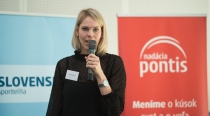Volunteering develops communities as well as your employees
A good program of volunteering is beneficial to everybody involved. That was one of the messages delivered in a seminar on corporate volunteering.











Enhancing employees’ loyalty, developing their skills and strengthening a company’s brand. That is just a few of examples of how helping others can help your company. Experts from well-known companies shared their experience with setting up and developing a corporate volunteering programme with over 100 HR, communication, and CSR managers. The seminar on corporate volunteering was held at Slovenská sporiteľňa in Bratislava on 16 March.
How it works in ČEZ
ČEZ Group launched its program of volunteering in response to a 2006 employee survey. Lenka Hybšová, a specialist in national sponsoring, pointed out that a large company takes a long time to set up the whole system. Their company took about a year to set up the technical parameters (from the point of view of HR, law, and similar) and another year to prepare the programme itself.
“Our slogan is We Help Where We Operate. Therefore, our employees can take one of the two days reserved for volunteering in any of the seven regions of the Czech Repubic,“ said Lenka. The non-profit organizations whose activities ČEZ offers to its employees are selected by Byznys pro spoločnost, a partner organization, which checks their quality and trustworthiness. The ČEZ group, however, also offers the possibility of an individual volunteering day according to an employee’s proposal. Since 2015 the employees have also enjoyed participating in family volunteering days at weekends.
Lenka emphasized several aspects which are important to take into account while launching a corporate volunteering programme. Instead of a one-time half-baked event, it is good to invest time into a well-thought out system, which can be further expanded. It is also essential to make internal communication available, transparent, and intelligible to everyone. The programme should be managed by an in-house coordinator. It should be supported by the management, which is crucial in terms of its long-term success. And it should involve good quality partner non-profit organizations, which the employees should help select.
“If corporate volunteering is set up correctly, it is beneficial to the company, employees, non-profit organization, as well as local community.” Lenka Hybšová said that it has the potential to improve a company’s image both on the outside and on the inside, strengthen corporate cohesion and relationships between colleagues. “Job applicants are more and more often asking about corporate volunteering opportunities. For the young generation it is an important motivating factor.”
Legislative framework of corporate volunteering
Slovak law does not recognize corporate volunteering, only a general concept of a natural person’s volunteering. Labour Code makes a distinction between three kinds of volunteering. In the case of corporate volunteering within a company’s project, an employer has relatively broad competencies to set up the system (paid/unpaid leave, how many days a year, etc.). Law does not oblige a company to take out special insurance; it is a company’s discretion.
An employee’s consent is required (it can be included in an employment contract or a separate document), as well as the scope and conditions of voluntary work (an employment contract, collective agreement, or an internal regulation). “It is important to have equal terms and conditions for all employees to eliminate a risk of discrimination, which employees can complain about,” said Marek Laca from bnt attorneys-at-law.
The attorney’s office is also active in expert volunteering; it is also involved in the Pontis Foundation’s programme Pro Bono Attorneys.
“In the case of expert volunteering, many companies assume that if this activity is part of their main business activities and is performed in working hours, it doesn’t have to be regulated. However, it would be better if the activity was regulated by an amendment to the employment or mandate agreement,” added Vladimír Kordoš.






